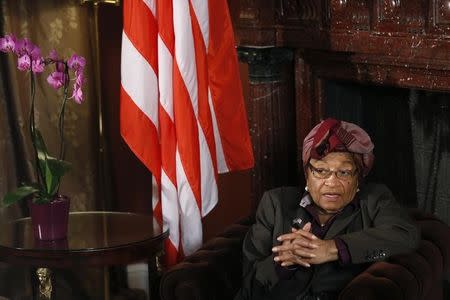Liberian president hopes U.S. Ebola pledge will spur others to help

MONROVIA (Reuters) - Liberian President Ellen Johnson Sirleaf called a U.S. decision to deploy 3,000 troops to West Africa a "significant moment" in the battle against the worst Ebola outbreak on record and said she hoped it would spur other nations into action. In a message to the Liberian people, Johnson Sirleaf said on Wednesday her government was "fighting back" against the deadly virus. Ebola has killed around 1,300 people in Liberia, the country hardest hit by the outbreak. "Our American partners realise Liberia cannot defeat Ebola alone. This disease is not simply a Liberian or West African problem. The entire community of nations has a stake in ending this crisis," Johnson Sirleaf said in a written statement. "We hope this decision by the United States will spur the rest of the international community into action," she said. U.S. President Barack Obama said on Tuesday the outbreak was a looming threat to international security and announced a major expansion of the U.S. role in trying to halt the spread of the disease, including the deployment of 3,000 troops. The U.S. plan also includes establishing a regional command and control centre in Liberia's capital; building 17 treatment centres with 100 beds each and training thousands of health workers. "The people of Liberia have suffered greatly since this disease took hold. But we are a strong and resilient people," said Johnson Sirleaf, a winner of the Nobel Peace Prize for her work on women's rights. "To Liberians, my message is simple - we are fighting back." The worst Ebola outbreak since the disease was identified in 1976 has already killed nearly 2,500 people, half of the number infected. It is threatening to spread elsewhere in Africa. The outbreak of the highly contagious virus, which causes fever and uncontrolled bleeding, was first confirmed in the remote forests of southeastern Guinea in March, then spread across Sierra Leone and Liberia. A handful of Ebola deaths have been recorded in Nigeria, Africa's most populous country. (Reporting by Daniel Flynn; Writing by Bate Felix, editing by John Stonestreet)

